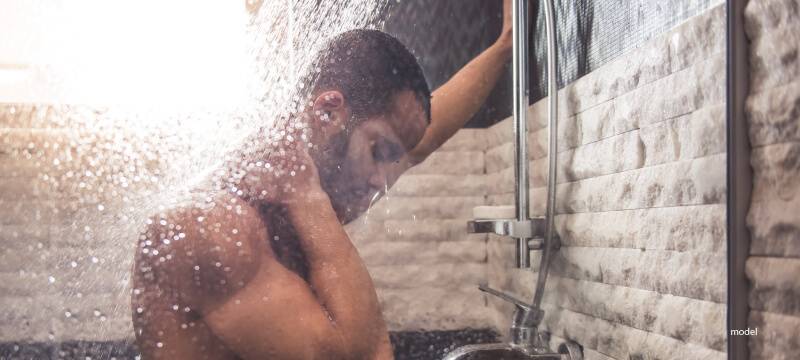Is Hard Water Harming Your Skin?

It’s estimated that nearly 85% of all homes in the United States have tap water that is considered to be “hard water”. This is water that has an overly high mineral content, usually calcium or magnesium carbonates. Mineral accumulation occurs naturally as water percolates through porous layers of limestone rock and chalk soil to later settle in underground aquifers.
While generally safe to drink, hard water can lead to issues like stains on tubs and faucets and even higher water bills (as appliances require more energy to properly function). Consistently bathing with hard water can also impact the health and appearance of the skin.
How does hard water affect the skin?
The most common effect of hard water on the skin is causing unnecessary dryness and irritation. This is due to the water’s inability to properly dissolve soaps (both used directly on the skin and detergents used on laundry). This unrinsed soap draws out the skin’s natural oils, leading to skin that is dry, flaky, and itchy.
The excess minerals within hard water can also directly dry on the skin, which clogs the pores and leads to acne breakouts. In drier climates, hard water is often cited as a cause of dermatitis. Finally, hard water can worsen symptoms of chronic skin conditions like psoriasis and eczema.
How can you tell if you have hard water?
Hard water manifests in different levels of severity depending on the level of calcium or magnesium it contains. This is why homes within different cities and counties can experience varying degrees of water hardness.
Some of the most common signs of hard water include:
- Dull and rough feeling clothes or linens after washing
- Stains and scale buildup along facet heads, sinks, and bath tubs
- Low water pressure in both showers and faucets
- Chalky or white spots on dried dishes after they are washed
- Dry skin and flat hair
If you’re experiencing the aforementioned skin issues (or flat hair) and have noticed any of the above signs at your house you may have a hard water issue. One way to confirm is to have your water tested. Morton salt offers free hard water testing strips here.
How to Counteract the Effects of Hard Water
There are several options for neutralizing hard water. The best (but most expensive) solution to hard water is to install a water softening system in your home. Water softeners create an ion exchange in the water: minerals including calcium and iron are removed and replaced with “softening” sodium ions. If a water softening system is not a viable option you may consider using a water softening shower head which can filter our hardening minerals when you shower.
Another option is to use a gentle cleanser instead of a standard cleanser to clean the skin as they rinse easier and will not dry out the skin. It’s also a good idea to opt for a natural, hypoallergenic laundry detergent.
Beyond mineral content, water temperature is also important for healthy skin. Taking a long hot shower will dry out and irritate the skin, even if “non-hard” water is used. You can even go one step further by using distilled water when washing your face.
Finally, it’s important to use a high-quality hydrating moisturizer daily, especially right after a bath or shower as this allows for the best absorption since the skin is still porous. Moisturizers add instant hydration while also forming a protective barrier that helps the skin retain moisture. Using a serum containing hyaluronic acid before applying a moisturizer can further boost your skin’s hydration.
Disclaimer: The contents of the Westlake Dermatology website, including text, graphics, and images, are for informational purposes only and are not intended to substitute for direct medical advice from your physician or other qualified professional.

My mom just moved into a new home that has a lot of hard water. She does not like how it is drying out her skin and making her skin feel rough. It might be useful for her to know that a water softener will end this issue for her.
it should resolve the issue and help tremendously.
It’s interesting that one of the signs of hard water is low water pressure. I never would have thought that the low water pressure in our house was caused by hard water. We’ll be sure to get that sorted out so it doesn’t end up damaging our pipes.
Thank you for explaining that dull rough feeling to clothes is a good sign that there are some issues with your water. I never thought about why our clothes might be feeling like that other than relating it to the soap we’re using. It’s definitely something we will look into since we do have a few other things happening like dry skin and hair.
Damn hard water 🙁
Makes sense that hard water can cause acne by clogging our pores. I never thought of that. Now I want to tst my water haha
My skin has been getting really dry after I shower, and I’m not sure what the problem is. It makes sense that it could be due to hard water! I’ll have to see if I can get a water softener installed to ensure that this gets handled right.
Wow, it really stood out to me when you explained that hard water can result in your clothing feeling rough and dull when it comes out of the laundry. As far as I know, rough clothing can irritate your skin and cause it to get really uncomfortable and itchy. It seems like using a water softener to counteract these effects would be really beneficial for someone with sensitive skin.